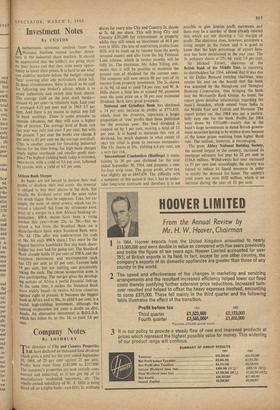Investment Notes
By CUSTOS
A DEPRESSING economic analysis from the ..National Institute started ancther down- turn in the industrial share markets. It should be appreciated that the jobbers are going short on their books and that they seize every oppor- tunity to lower their prices. It is hard to see what can stabilise markets before the budget-except 'bear' covering after any particularly sharp fall. In these circumstances, there is much to be said for following one broker's advice, which is to avoid industrials and switch into bank shares. The average yield on the joint stock banks- around 41 per cent-is relatively high. Last year it averaged 4.15 per cent and in 1963 3.7 per cent. And there is no reason to expect any fall in bank earnings. There is some pressure to restrain advances, but they will earn a higher rate of interest. The average level of Bank rate last year was only just over 5 per cent, but with the present 7 per cent the banks can charge 8 per cent to 81 per cent on the average overdraft. (This is another reason for forsaking industrial shares for the time being, for high bank charges imply higher overheads and smaller profit mar- gins.) The highest-yielding bank today is NATIONAL PROVINCIAL with a yield of 5.1 per cent, followed by LLOYDS with a yield of 4.7 per cent.
African Bank Merger
As banks are not forced to declare their real Profits or disclose their real assets the investor Is obliged to buy their shares in the dark, but usually the dividend cover and the asset value are much bigger than he supposes. Take, for ex- ample, the BANK OF WEST AFRICA. which has re- ceived a takeover bid from the STANDARD BANK prior to a merger in a new African banking or- ganisation. BWA shares have been a rising market this year-from 25s. to 39s.-but re- ceived a bid from the Standard Bank on a share-for-share basis when Standard Bank were 59s. 3d. (The offer was underwritten for cash at 58s. for each BWA share.) This must be the biggest lucrative handshake that any bank share- holder has ever had for going out. The Standard Bank already holds 11 per cent of BWA and the NATIONAL PROVINCIAL and WESTMINSTER each has 121 per cent to 13 per cent. LLOYDS held 14 per cent, but arc retiring ano presumably taking the cash. The CHASE MANHATTAN BANK is also participating. The merger gives the develop- ing nations of Africa a useful financial link-up. At the same time, it makes the Standard Bank more widely based-in twelve African countries against eight at present. It becomes the biggest bank in Africa and at 58s., to yield 6 per cent, is a useful high-yielding investment, although the coming corporation tax casts a doubt on divi- dends. An alternative investment is B.O.L.S.A. Which has fallen 6s. to 34s. 3d. to yield 5.6 per cent.


































 Previous page
Previous page